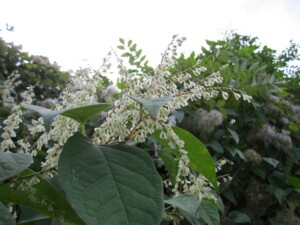
How To Make A Claim In Respect Of Japanese Knotweed

Weeds are flowers too, once you get to know them. – A.A. Milne, ‘If I May’

Well, we had to have a picture of Winnie the Pooh following a quote from the author that imagined him.
Following this with a bit of apparently innocuous foliage….

…except that this is Japanese Knotweed. A very tall plant with large triangular leaves, hollow red stems that are a bit like bamboo and small, white, tufty flowers that appear in late summer and autumn. It first came to Britain in the 1850’s. The Victorians loved it and propagated it so it is literally everywhere.
It is though, a nasty non-native blighter which grows from rhizomes under the soil. You might be able to see new growth and old previous-season canes. It can lie dormant for 10 years lurking under the surface sparking into growth when disturbance reactivates it. Moving soil for development or just innocent digging will give it a burst of growing energy.
This plant is not your friend. All the plants are female. A super spreader. It is a species demanding “controlled disposal”.
But why am I giving you a lesson in this? Dangers lurk and if you are the unsuspecting buyer of a property or piece of land blighted with this stuff you might be looking for some legal guidance.
“I bought the house without knowing it was here”
First, a Latin phrase – caveat emptor. I didn’t do Latin at school but it means “buyer beware”.
So, when you buy a house or a bit of land the risk in relation to what you are buying – condition and state – is yours.
Ordinarily you will instruct a solicitor to do the buying bit for you. You will instruct a surveyor to take a look at the thing you intend to buy and to do a report. If you are getting a mortgage the surveyor might be the lender’s recommended person or on some approved list circulated by them or a sales agent.
The person or organisation selling to you will fill in certain documents one of which is a Property Information Form TA6.
TA6
This is a standard form a seller has to fill in to tell the buyer things about the property or land. It is a kind of disclosure document – actually a pretty important one.
Statements made on this form are “representations”. The person signing the form must have a reasonable belief that the statements made are true. These statements will be relied upon by a buyer.
Question 7.8 says this:
“Is the property affected by Japanese Knotweed?”
There are 3 tick box options for the seller: “Yes”, “No”, “Don’t Know”.
Seems quite an innocuous question really nestling covertly half way through the form.
Knotweed is a knotty problem
Building over it won’t stop it or get rid of it.
Setting fire to it or dowsing it in diesel (a common “fix” which unscrupulous developers, contractors and landowners adopt) won’t, either.
Digging it out (or trying to) will be futile as this won’t get rid of all the remnants of rhizome and it will regrow. There is further risk here too – the risk in transportation. The dropping of a single rhizome could “infect” an uncontaminated site and liability will arise. A collection truck driving onto an infected site could take up a piece of root in the tyre treads and deposit it elsewhere.
Schedule 9 of the Wildlife and Countryside Act 1981 lists Japanese Knotweed as a species authorities want to prevent the spread of. Sanctions can be severe.
Tarmac or concrete won’t arrest growth – it will find a way as it can spread horizontally and vertically.
Honestly – any unapproved method of treatment will not work.
So who you are you going to sue?
Your solicitor?
The surveyor?
The seller?
The seller is the easiest option. If there is a false representation in the TA6 which you relied upon.
When I say “false” this could mean one made negligently (carelessly or without reasonable grounds) – ticking the wrong option in the TA6 mistakenly…or deliberately, fraudulently.
A bit of law comes into play here: section 2(1) of the Misrepresentation Act 1967.
Has the surveyor done his/her job. Liability may have been limited by the scope of the survey but a RICS accredited expert who fails to address Japanese Knotweed possibilities will struggle to escape.
What about your solicitor. Were you properly advised about the TA6 replies from the seller, did your solicitor appoint the surveyor or direct what the survey should look at?
Maybe the blame rests elsewhere. Is there an encroachment from a neighbouring property or has a developer nearby moved excavated contaminated soil without proper consideration of risk and/or without proper licensing? In these scenarios claims in nuisance can arise.
Oh and if a developer is moving contaminated soil still then an injunction might be needed to stop this in order to protect your property.
Is it worth taking action?
Treatment of Knotweed can cost £5,000 – £10,000. Excavation can be ten times this.
It will be distressing dealing with this and you can be compensated for that.
The biggest “hit” for you will be the potential diminution in value of your property. Typically, between 5% and 10%.
And do remember that you can’t wait indefinitely to start a claim.
If you are facing a claim related to Japanese Knotweed or think you might have a claim to make against someone else then contact Adrian Samuel at the firm.
Email: adrian.samuel@jonathanlea.net
This article is intended for general information only, applies to the law at the time of publication, is not specific to the facts of your case and is not intended to be a replacement for legal advice. It is recommended that specific professional advice is sought before relying on any of the information given. © Jonathan Lea Limited 2023.
